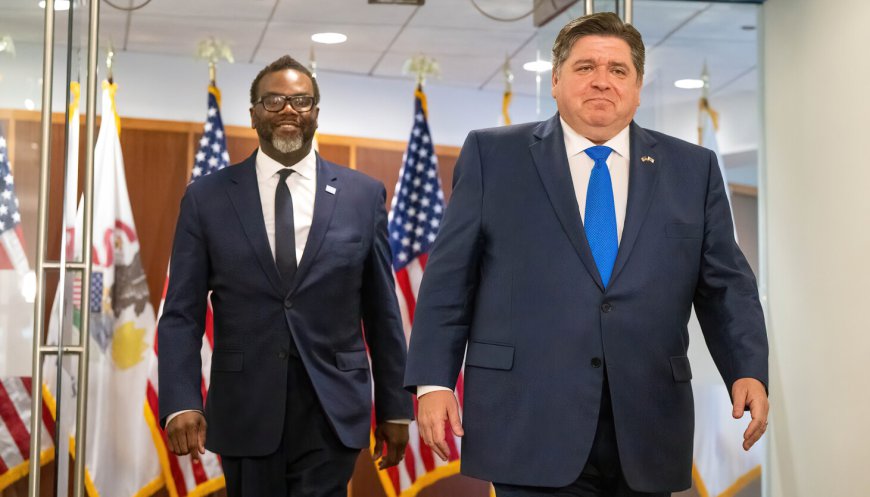With big problems and modest requests, Mayor Johnson heads to Springfield hoping to break losing streak

Chicago has big financial problems — at the city, the schools and the CTA — but you’d never know it by the modest wish list Mayor Brandon Johnson is carrying with him to Springfield Tuesday.
With five weeks to go in the spring session, Johnson wants to revive a tax on prepaid cellphones and calling cards, extend the $5-a-month 911 surcharge, ratchet up funding for the city's unified shelter system and improve reimbursement rates for transportation, bilingual education and special education services provided by the Chicago Public Schools.
That’s pretty small potatoes for a mayor who campaigned on a promise to raise taxes on businesses and wealthy Chicagoans by $800 million and claims the state owes $1 billion to the Chicago Public Schools.
But even those relatively small legislative aims may be difficult to achieve.
Johnson has accomplished almost nothing in Springfield, beyond persuading Illinois Senate President Don Harmon not to call for a vote on a bill that would have extended a moratorium on public school closings and shielded Chicago’s selective-enrollment, magnet and charter schools from major changes.
The mayor has a frosty relationship with Gov. JB Pritzker, who is grappling with his own multibillion-dollar budget shortfall. And there has been constant turnover and turmoil in the Mayor’s Office of Intergovernmental Affairs.
“He’s coming down rather late. Time is ticking. You would hope to have these requests earlier in the session,” state Rep. Anna Moeller, D-Elgin, said. “Chicago is very important to the state, but we have a lot of needs. We have to weigh all of them as we decide our budget.”
Johnson is expected to meet Wednesday with Pritzker, Harmon and Illinois House Speaker Emanuel "Chris" Welch. Ald. Marty Quinn (13th), a top political operative and field general for his mentor and now-convicted former Illinois House Speaker Michael Madigan, said Johnson’s failures in Springfield “border on malfeasance.” He added that he expects the mayor's two-year losing streak to continue.
“He hasn’t put in the time. He hasn’t sold his agenda — not only to the governor, but … to the leaders,” Quinn said. “You have to really work that. The fact that you’re going to go to Springfield and have a party for the legislators and think you’re going to hit it out of the park — I can tell you that’s not going to happen.”
After a January run-in with the mayor over the governor’s stalled hemp regulations, Pritzker complained the mayor and his team “don’t have good relationships in Springfield, in part, because they don’t do the outreach that’s necessary.”
The cold war appeared to continue last week, when Pritzker noted the state budget is crafted “in the latter half of the prior year” and unveiled in February.
“It’ll be hard for us to talk about things in the current budget,” the governor said then. “Maybe there are things we can move around in the budget that will be beneficial to the city of Chicago.”
Rahm Emanuel made only one lobbying trip to Springfield during his eight years as mayor. He worked the phone and met privately with key lawmakers to avoid telegraphing his requests as Chicago bailouts.
The strategy worked, and Emanuel was able to secure funding for the CTA’s Red Line Modernization Project, a revised school funding formula and a host of pension reforms.
“Rahm was tenacious. He had a clear-cut agenda a year in advance and a real team down there,” Quinn said.
“Mayor Johnson has gotten rid of some capable people. He lost Mike Ciaccio, who worked on the speaker’s staff in the budget department, then was a lobbyist for the Teamsters. You lose institutional knowledge like that.”
Former Northwest Side Ald. John Arena (45th), Johnson’s new Springfield lobbyist, could not be reached for comment.
The mayor’s hiring of Arena angered some of his former City Council colleagues because of political bridges Arena burned during his two terms as a Chicago alderperson.
State Rep. Kam Buckner, D-Chicago, is optimistic about the 911 surcharge, having championed the extension and pushed it through the Illinois House. He expects no action on a new domed stadium for the Bears, either in Chicago or Arlington Heights.
As for Johnson’s Springfield presence — or the lack of it — Buckner said it’s a work in progress.
“I don’t know why the first two years for him have been rocky with the state Capitol, but I hope that it can change,” Buckner said.
Pressed on what it will take for Johnson to break the losing streak, Buckner said, “some honest conversation and just some level-setting. Way too often, people negotiate through press release and social media when they should be sitting down principal to principal.”
What's Your Reaction?
 Like
0
Like
0
 Dislike
0
Dislike
0
 Love
0
Love
0
 Funny
0
Funny
0
 Angry
0
Angry
0
 Sad
0
Sad
0
 Wow
0
Wow
0






































